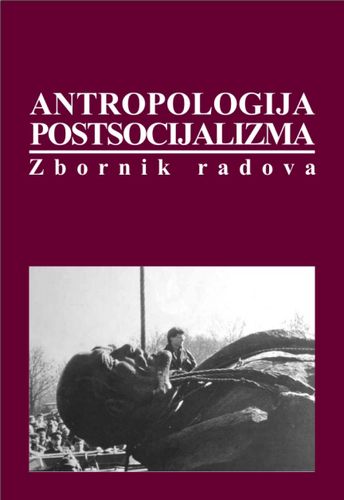
We kindly inform you that, as long as the subject affiliation of our 300.000+ articles is in progress, you might get unsufficient or no results on your third level or second level search. In this case, please broaden your search criteria.

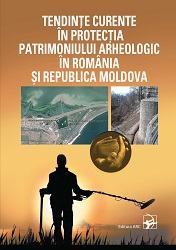
The book is a collection of articles on archaeological heritage preservation in the Republic of Moldova and Romania.
More...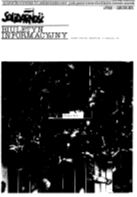
among others: * FRAGMENTY HOMILII I PRZEMÓWIEŃJANA PAWŁA II W POLSCE * "Solidarność" wita Ojca Świętego - fragmenty oświadczeń organizacji związkowych
More...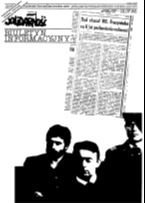

among others: * Przesłanie dla Solidarności * Powrót ze spotkania z Ojcem Świętym
More...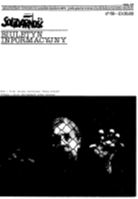
among others: * Zobaczyć na własne oczy - wywiad z Michelem Piccoli *Aktorzy nie dają się podejść
More...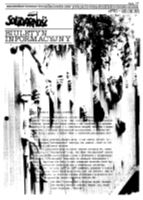
among others: * Gospodarczy dorobek stanu wojennego * Sprawozdanie TKR "Hutmen"
More...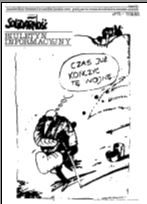
among others: * Lelewel /Liceum im-Joachima Lelewela w Warszawie * fundusz rozwoju rolnictwa - oferta Kościoła
More...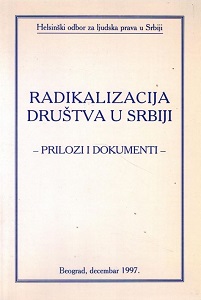

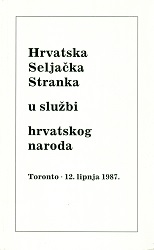
The booklet, published in 1987 by "Središnji odbor Hrvatske Seljačke Stranke" (Central Committee of the Croatian Peasant Party) with office in Brussels (Belgium), is a report on the "World Meeting of the Croatian Peasant Party and Croatian Workers' Union" (Toronto, May 1987) with contributions by: Juraj Krnjević, Lovro Črep, Josip M. Torbar, Eugen Laxa, Tihomil Rađa, Mehmed Bašić, Đuro Đurković, Mirko Vidović, Dorothy Obradović, Krešimir Butković, Zvonko Mustapić, Stjepan Golubić, Juraj Boljkovac, Stjepan Košutić, Ivo Tomić, Ferid Salihović,
More...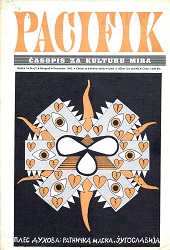
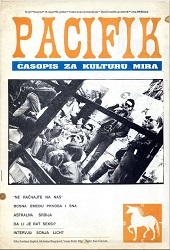
published in 1992 by "Centar za antiratnu akciju"
More...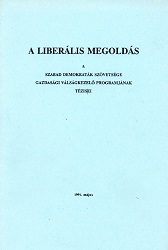
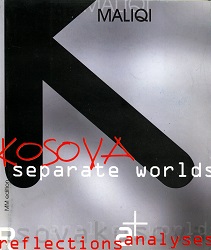
Published in 1998 by Dukagjini Publishing House (Prishtina) // "I had not planned to write this book. It gathers a number of articles that deal with current (1998!) aspects of the problem of Kosova and the Balkan crisis in general. The selection of articles is perhaps not as representative as it could have been; out of hundreds that I have published since the mid- 1980s to today, included in this book are only those that were translated into English. Still, I hope that this selection of articles will be useful to specialists dealing with the Balkan crisis and the Albanian question, as well as to journalists and those interested in learning more about the essence of the processes underway. // For those with a wider interest, I have included two texts that deal with Kosova's art scene in the 1990's as well as an interview containing autobiographical references and information in which internal political and spiritual currents among Kosova Albanians overlap." (Shkelzen Maliqi)
More...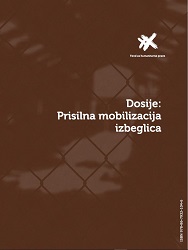
The dossier "Forced Mobilization of Refugees" is the twelfth file of the Humanitarian Law Center (HLC), which aims to provide the public with evidence of systematic and widespread violations of human rights of refugees in Serbia. The dossier is based on more than 500 statements of forcibly mobilized refugees given to HLC researchers during 1997 and 1998 and members of the families of refugees who died or disappeared after being sent to the area of armed conflict; court documents from more than 120 litigation before the courts in Serbia for damages, in which the HLC represented forcibly mobilized refugees or their families; evidence presented before the International Criminal Tribunal for the Former Yugoslavia (ICTY), as well as documents obtained by the HLC from the Serbian Ministry of the Interior under the Law on Free Access to Information of Public Importance. The Dossier also used HLC reports on the forced mobilization of refugees published in the 1990s, reports from other domestic and international human rights organizations, as well as media reports.
More...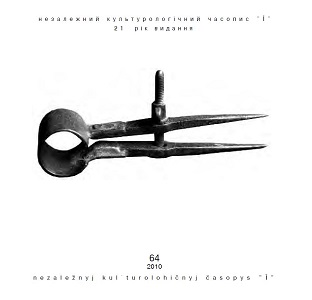
In order to make the thorough mendacity of Putin's rhetoric about "Ukraine as a State of Neo-Nazis" fully evident, CEEOL is offering the Ukrainian Jewish journal ”Ї“ as the strongest possible proof of a habit of "modern Ukrainian and world intellectual thought". The NGO "Ї", an independent cultural organization founded in the late 1980's in L'viv, focuses on modern Ukrainian and world intellectual thought. It offers periodic forums for discussion of issues concerning Ukraine and, among others, Europe, Russia, post-Byzantium, the Muslim Renaissance. It analyzes the current situation in order to develop future socio-political strategies. The organization also publishes "Ї", a quarterly journal dealing with European and Ukrainian issues in politics, philosophy, and culture. It also examines the relationship of Ukrainians with Russians, Poles, Austrians, and Jews and places Ukraine in a modern geopolitical sphere that can further Ukraine's identity as a modern state.
More...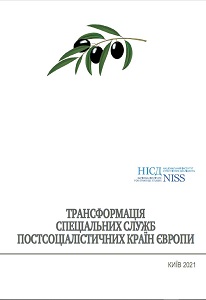
After the Second World War in the countries of Central and Eastern Europe, which came under the influence of the USSR, the creation of special services was on the Soviet model (with some national features) and with the help of advisers from Moscow. In different years, the security agencies of these countries had NKVD-MGB-KGB offices of the USSR, which later also performed the function of coordinating the activities of special services in the Warsaw Pact countries (hereinafter - ATS). // The processes that took place in the Soviet Union in the late 1980s directly affected the states of the so-called socialist commonwealth. By 1991, anti-communist opposition had come to power in virtually all of these states, and the new governments set out to form a multiparty system and a democratic society, accompanied by the transformation of the special services.
More...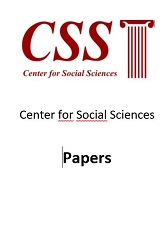
This paper provides historical background to the formation of Georgia’s current borders in the course of 20th century and analyzes the stance of Georgian state on border delimitation after independence. In the first part of the article, the period of 1918-1921 when most border changes took place in the South Caucasus is examined. Then the Soviet period is discussed. The article moves on to examine the period of 1991-93, during which the successor states of the USSR reconfirmed the internal republican borders of the USSR. The second part of the article describes the process of Georgia’s negotiations with neighbouring states on border delimitation after the restoration of independence. Delimitation of the border cannot be achieved unilaterally. It is a bilateral process and the failure to reach the consensus should be attributed to both negotiating parties. The aim of this article is not the identification of the guilty party, but rather identification of the actual reasons for lack of progress in negotiations. It reflects a Georgian perspective of the past and present state of play, since it is mostly based on documentary analysis and interviews conducted in Georgia. This research argues that the lack of political will from all negotiating parties has been the main reason for protraction of the process of border delimitation. It is a first attempt to bridge the existing gap in research on the border delimitation issue in interstate relations. Unfortunately, border delimitation is a field which has not been extensively researched either by Georgian or by international scholars, which makes this article even more timely and relevant.
More...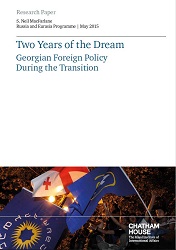
Despite some stumbles, the Georgian Dream government has managed to make considerable progress on most of its foreign policy objectives. Relations with Russia have improved significantly, reopening an important trading relationship. At the same time, relations with Western institutions have deepened. Georgia initialled an association agreement with the EU in November 2013. Partly prompted by the crisis in Ukraine, the EU accelerated the process that led to signature of the agreement in June 2014, which the European Parliament ratified in December. This happened without the kind of interference from Russia that Armenia and Ukraine experienced over the same issue. In addition, although Georgia failed to obtain the NATO Membership Action Plan (MAP) that it had sought at the organization’s September 2014 summit, NATO agreed to enhance cooperation with it. At the same time, the government has delivered on popular demands for members of the previous government to be held to account for alleged corruption and abuse of power. This is a puzzlingly positive outcome, which this paper seeks to explain. The paper begins with a brief discussion of the background to Georgian Dream’s electoral success. It then analyses the major challenges Georgian Dream faced in foreign policy and its performance in dealing with them. The paper concludes by considering how sustainable this success is, given that it is due mostly to factors outside Georgia’s control. // A CHATHAM HOUSE PUBLICATION, PUBLISHED BY THE ROYAL INSTITUTE OF INTERNATIONAL AFFAIRS
More...